Best Offline Java Decompilers %currentyear%
A decompiler can convert a. Class file to source code from java. A class file contains highly optimized instructions executed by the java virtual machine or the jvm procyon is one of the most common java decompiler open source. New features, implemented from java 5 to the most recent java version, can be easily accessed decompiler is designed to deal with the java programming language’s modern features. It can decompile new java features like lambdas and the switch statement. . …
When a Java source code is compiled, the Java compiler with a.class extension converts it to Java class format.
The class file contains highly optimized instructions that are executed by the Java Virtual Machine or the JVM in the form of Java instructions. .class file includes symbols that are stored as one byte with each bytecode instruction.
A Java Decompiler can convert a .class file to source code from Java.
While the exact java source code from which the.class file was created may fail to be released, the majority of the code will be the same.
For cases where you missed the source code, a decompiler will be useful.

In case you are unable to trace the source code, a Decompiler can be useful.
You’re just going to decompile the software you built and get your Java codes back.
Here’s the list of best Java Decompilers.
List of 8 Best Java Decompilers.
1. Java Decompiler Project
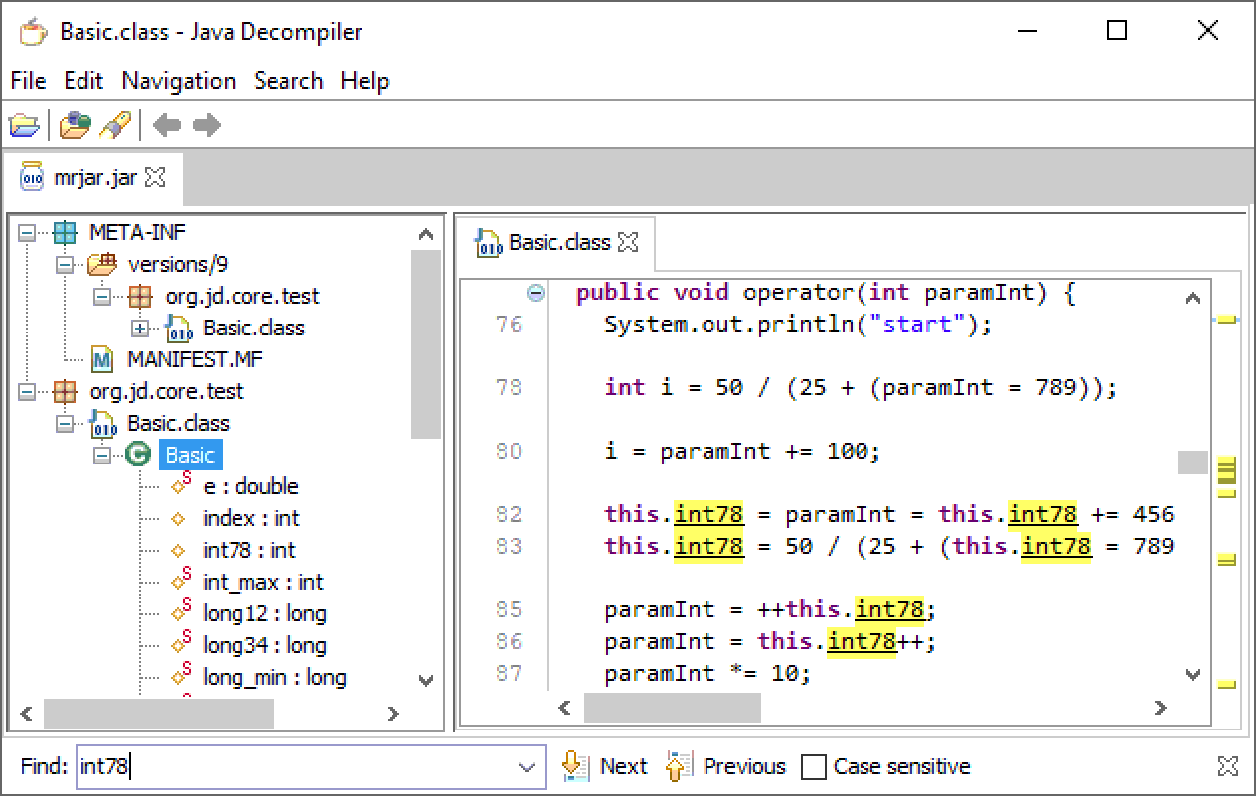 The Java Decompiler project was developed primarily to decompile bytecode for Java 5 and other later versions.
The Java Decompiler project was developed primarily to decompile bytecode for Java 5 and other later versions.
The decompiler can be used on three main Windows, Mac and Linux operating systems. One reason for Java developers ‘ massive popularity is because it can easily be combined with widely used IDEs like IntelliJ and Eclipse.
JD Project uses JD-GUI. It is a graphical interface that is easy to use and interactive. Throughout debugging, the decompiler shows the source code.
Well, this plugin is under development now, but with existing features, you can still use it. JD Project works with most compilers and features like drag-and-drop and shortcut. It even makes files from JAR and ZIP.
In a class hierarchy, you can browse the files and the logs are displayed, and you can decompile class files that appear in traces of Java stack.
2. Cavaj Java Decompiler
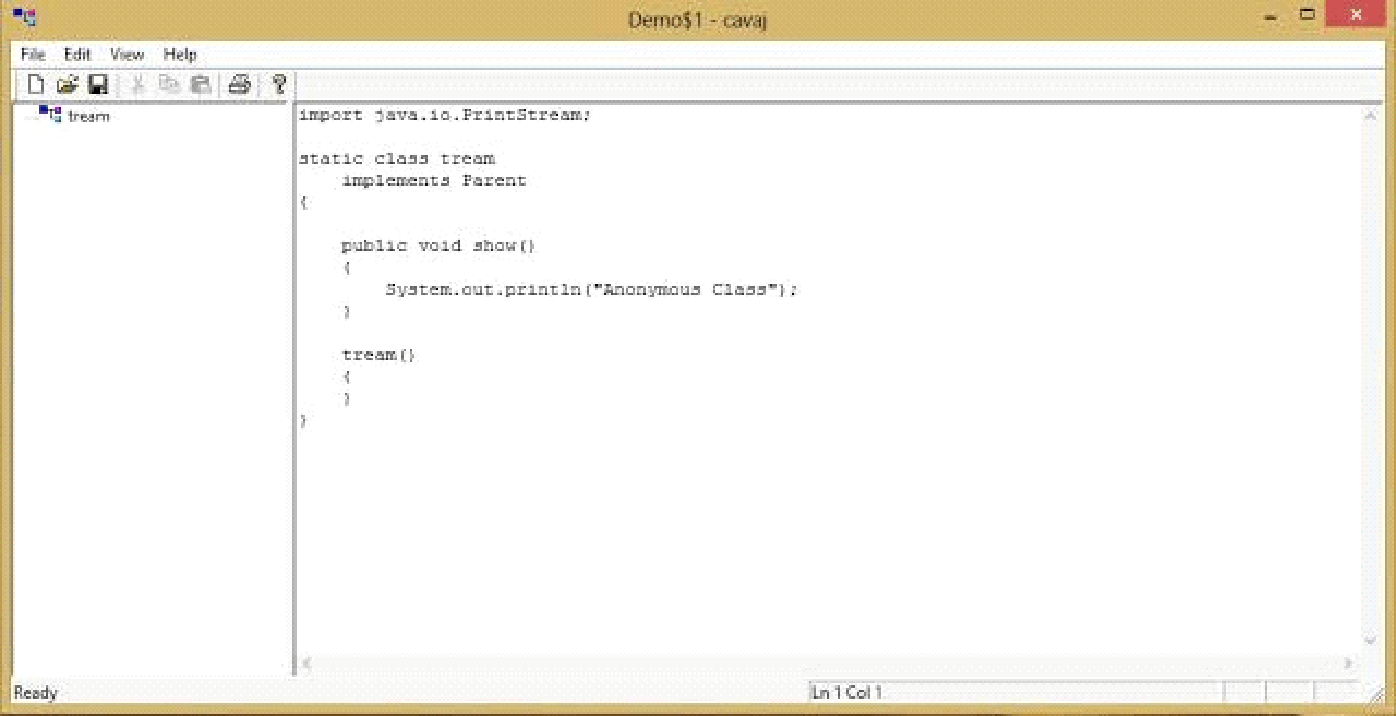 Java’s Cavaj Decompiler is a freeware that does not require Java to be installed to decompile a file. It’s a standalone Windows program with a good user interface.
Java’s Cavaj Decompiler is a freeware that does not require Java to be installed to decompile a file. It’s a standalone Windows program with a good user interface.
Several keyboard shortcuts and edits allow users to use Cavaj Decompiler to work smoothly.![]()
It is a free Java decompiler that can be used to convert bytecode, ZIP and JAR files to Java source code. If you want to decompile Java applets, it can also come in handy.
Cavaj is developed specifically for the operating system of Windows. This means that if you are using Mac or Linux, it may not benefit you. It also creates the decompiler to generate specific Java codes. It has no bugs or other problems that may affect its accuracy levels.
3. Procyon Java Decompiler
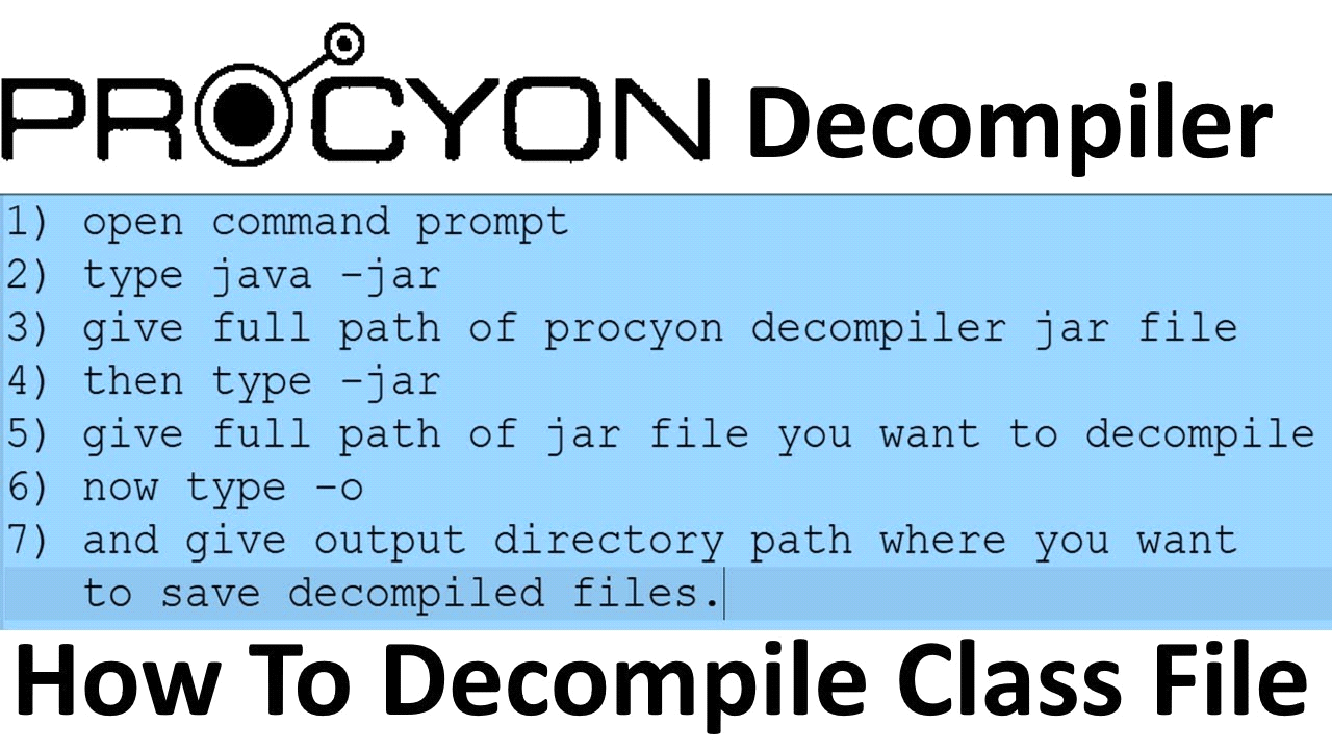 Procyon is one of the most common Java decompiler open source.
Procyon is one of the most common Java decompiler open source.
One of its unique features is to handle or deal with Java 8. New features, implemented from Java 5 to the most recent java version, can be easily accessed. It allows Procyon to be used as an alternative if other versions of java fail.
Procyon’s classes, annotations, change statements, Enum declarations, and Lambdas are some of the aspects Procyon can address.
4. DJ Java Decompiler
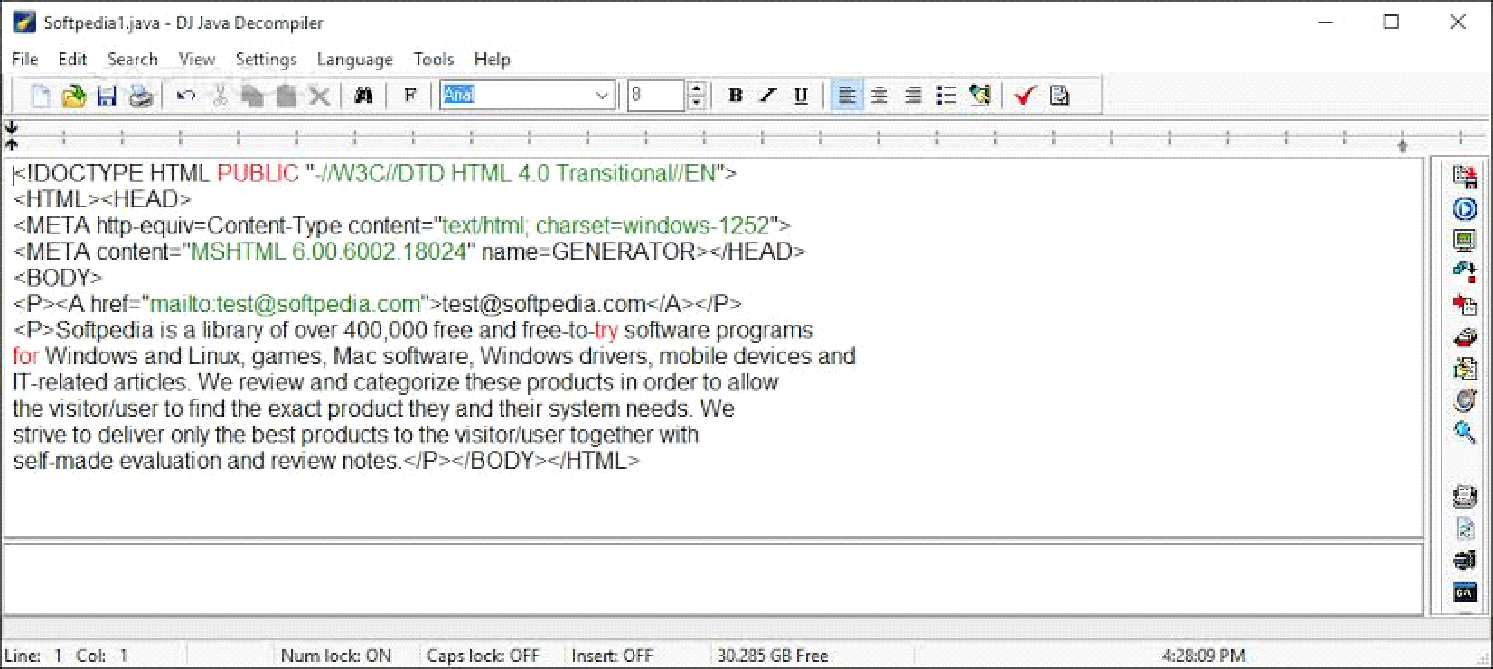 A disassembler and decompiler for Windows XP, Windows 2003, Windows Vista, Windows 7, Windows 8, 8.1 and 10 are available from DJ Java Decompiler on Windows 8.1 or 8. It can decompile complex Java applets and binaries for exact source code creation.
A disassembler and decompiler for Windows XP, Windows 2003, Windows Vista, Windows 7, Windows 8, 8.1 and 10 are available from DJ Java Decompiler on Windows 8.1 or 8. It can decompile complex Java applets and binaries for exact source code creation.
Again, DJ Java Decompiler is an independent application that does not need the installation of Java, JVM or JDK.
Drag & Drop apps work smoothly, and you can decompile files in .class on the hard disk of your computer or a linked network drive.
5. AndroChef Java Decompiler
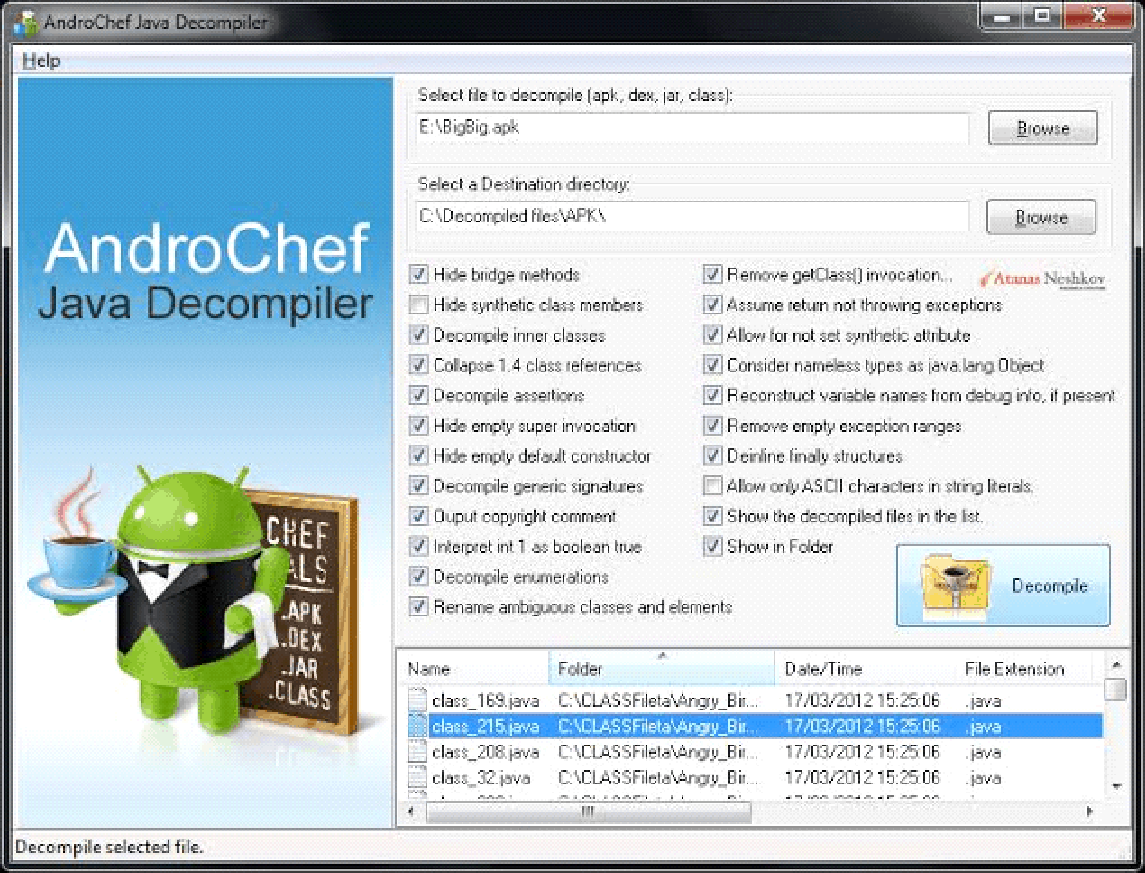 AndroChef is another Java decompiler accessible only to users of Windows. You can use it to decompile any bytecode from java, even to those that are extremely complex to your mind.
AndroChef is another Java decompiler accessible only to users of Windows. You can use it to decompile any bytecode from java, even to those that are extremely complex to your mind.
AndroChef is only available on Windows operating systems. It is also possible to easily decompile Java 6, Java 7 and Java 8.class and.jar files. AndroChef can also handle applets, JAR, DEX and APK files, besides, to simply decompiling.class files. It has a user-friendly GUI, making it a Java decompiler that is easy to use.
It supports features such as generics, enums, and annotations in the Java language. You can decompile it with the ‘ Decompile ‘ button after selecting the file or section of the document, and records will be decompiled to the position you chose.
6. CFR Java Decompiler
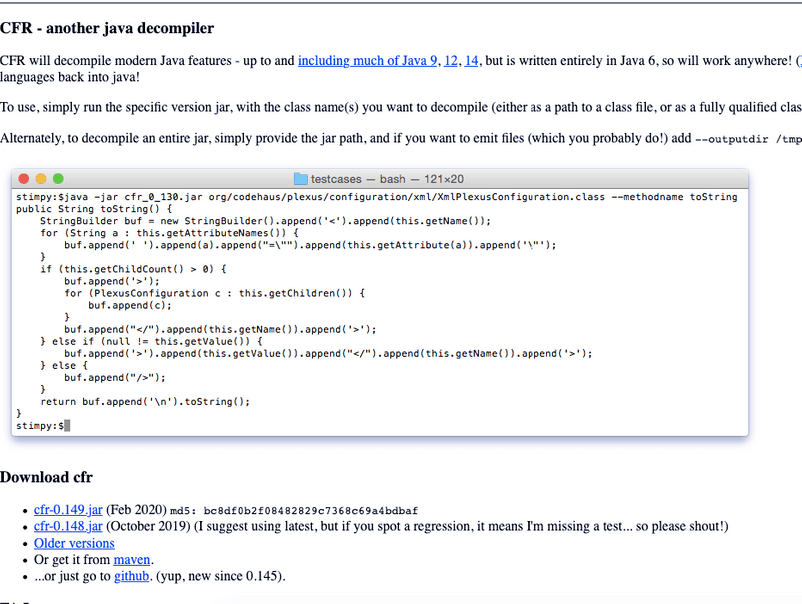 CFR is written in Java 6 but is capable of decompiling the latest Java 8 lambdas and Java 7 String switches features. You should provide the jar route and get the job done to decompile a whole jar.
CFR is written in Java 6 but is capable of decompiling the latest Java 8 lambdas and Java 7 String switches features. You should provide the jar route and get the job done to decompile a whole jar.
It is designed to deal with the Java programming language’s modern features. It can decompile new Java features like lambdas and the switch statement. It means that if you use Java 8, you don’t have to worry.
This decompiler’s only drawback is that it is not an open-source application. However, it has a command-line tool which is suitable for faster and more efficient decompiling operation.
7. JBVD (Java Bytecode Viewer and Developer)
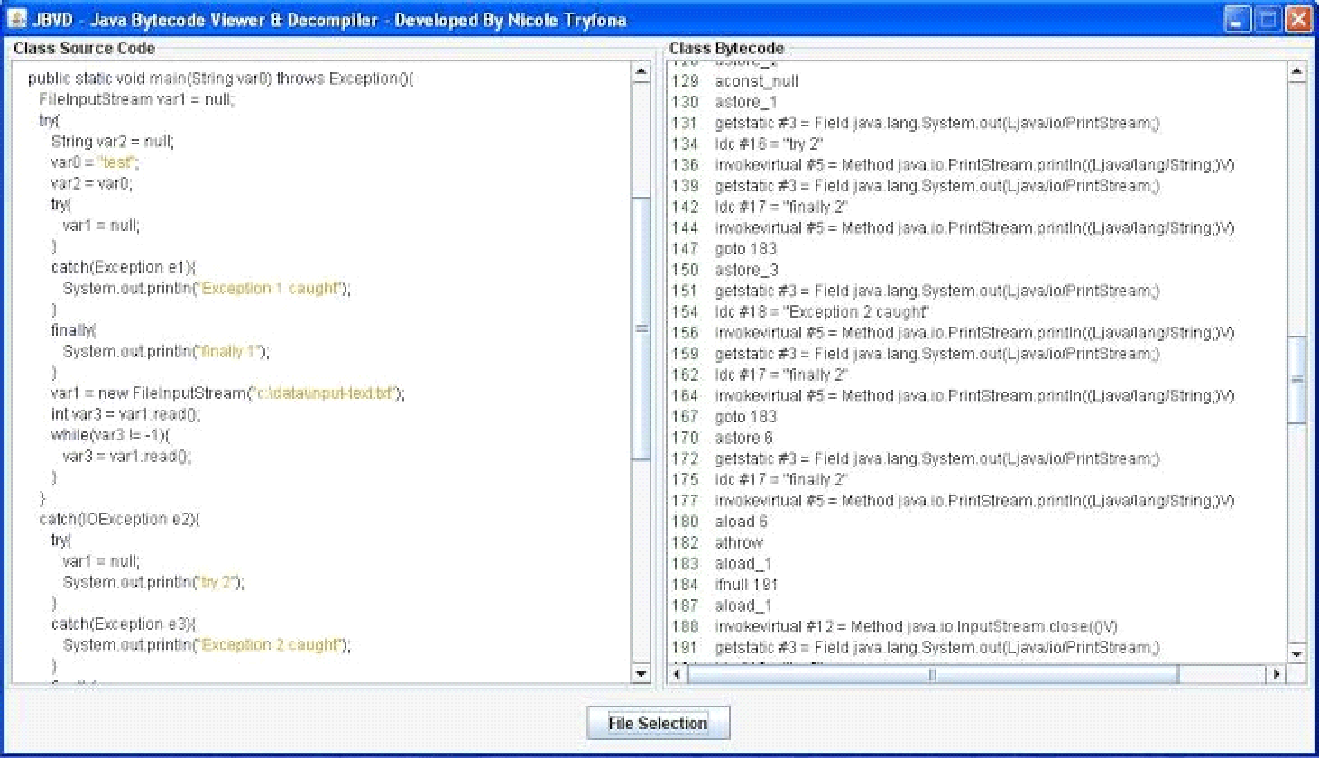 JBVD is based on the library of the open-source javascript. It’s only available for Windows OS.
JBVD is based on the library of the open-source javascript. It’s only available for Windows OS.
To operate with your computer, JBVD allows java to be enabled. It is a powerful decompiler that uses the open-source library javascript to convert the.class file to the source file of Java. The software needs to install Java to run on your computer.
You will quickly make selections prompting in a single click a file selection window.
Select the file .java or .class and the information will be displayed in the window. Therefore, JBVD can act as a java viewer as well as a decompiler.
8. Fernflower Java Decompiler
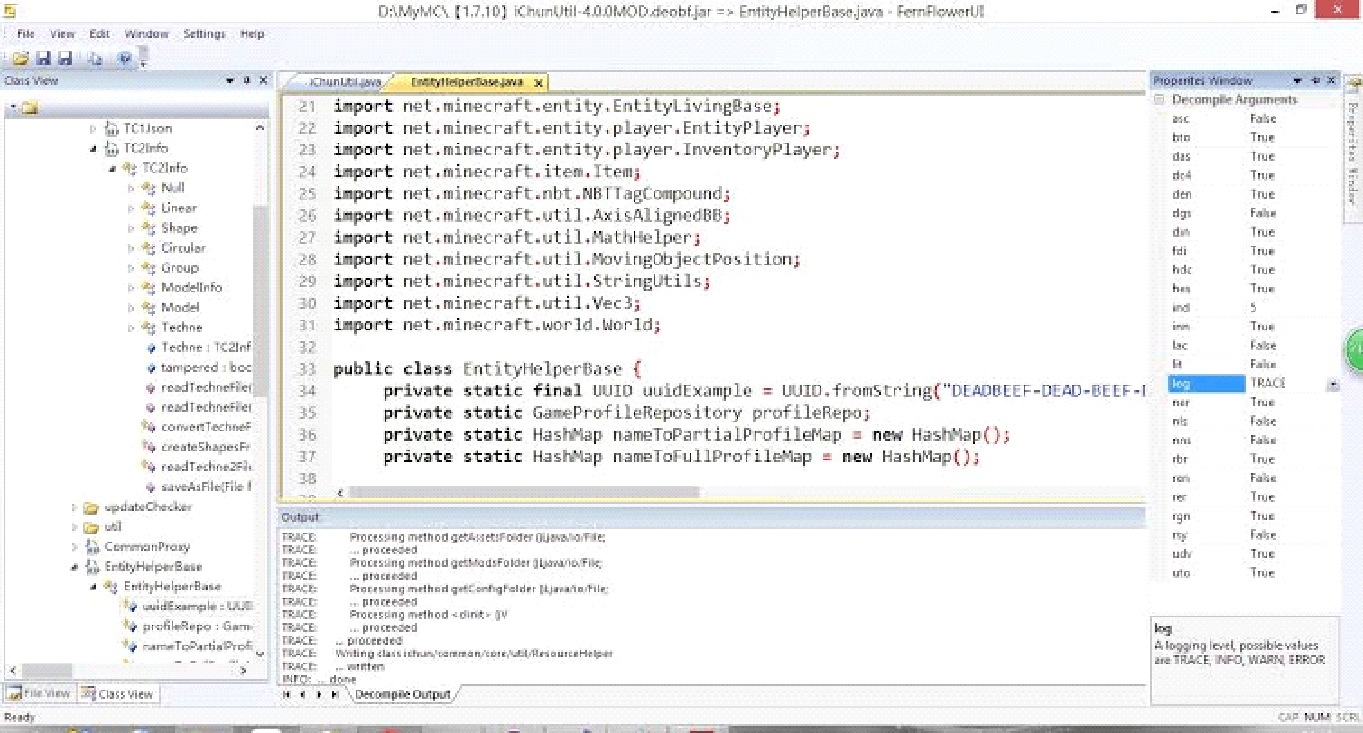 Fernflower is Java’s analytical decompiler. It is still under development and is being bought publicly. It renames all the abstracted symbols and ends up putting them in a JAR file.
Fernflower is Java’s analytical decompiler. It is still under development and is being bought publicly. It renames all the abstracted symbols and ends up putting them in a JAR file.![]()
Conclusion:
There are plenty of decompiler choices and you can choose according to your needs.
Choose the conventional decompiler solutions if you are searching for a decompiler with the right GUI and one-click decompilation.
However, the new ones being built offer a lot of new decompilation functionality to decompile abstracted codes and the latest Java applications.
Most of these Java decompilers are also viewers, so even without having Java in your system, they act as standalone programs that allow you to work with Java code without having Java installed in your system.

Hello! My name is Lucas, and I am the creator of ursuperb.com. I’ve been writing about technology for almost 10 years now, and I love talking about tech news, reviews, and tutorials. I’m currently living in San Francisco, CA, and I’ve been blogging professionally since 2012. I love what I do, and I really enjoy interacting with people online. I believe in creating positive change for humanity, and I try to inspire others to do the same. You can read more about me here.
My favorite thing about Ursuperb is that I’m able to provide useful information to anyone interested in learning more about technology. No matter what kind of tech you use (computer, smartphone, tablet), you will definitely find something interesting to read on Ursuperb. So, let’s take a look at some of the topics I cover on Ursuperb:
1) How To Build An Online Business With WordPress
2) How To Make Money On YouTube Using AdSense
3) What Is Google Analytics? And Why Should You Use It?
4) How To Make Your Own Website Design Software For Free



